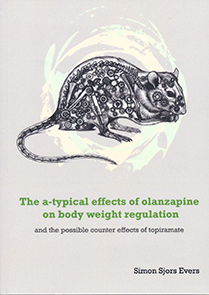Effectiviteit antipsychoticum en bijwerking gewichtstoename mogelijk voorspelbaar
Het antipsychoticum Olanzapine (OLZ), voorgeschreven bij schizofrenie, kan bij sommige patiënten gewichtstoename en insulineresistentie veroorzaken. In zijn proefschrift toont Simon Evers aan dat de gewichtstoename door Olanzapine vooral voorkomt bij mensen met een lage thyroïd stimulerend hormoon (TSH)-spiegel in het bloed. ‘Op basis van dit onderzoek en wat we al weten over schizofrenie, denk ik dat TSH een voorspeller kan zijn voor de effectiviteit van Olanzapine.’ Evers laat ook zien dat het anti-epilepticum Topiramaat deze gewichtstoename kan tegengaan. Hij promoveert 6 maart 2015 op zijn onderzoek aan de Rijksuniversiteit Groningen.
Schizofrenie is een complexe aandoening, waar veel neurotransmitters in de hersenen bij betrokken zijn. Een middel tegen schizofrenie grijpt dan ook in op verschillende mechanismen in het lichaam. Daardoor zijn bijwerkingen bijna niet te voorkomen. Het veel gebruikte Olanzapine remt receptoren voor onder meer dopamine, serotonine, histamine, muscarine en noradrenaline. De belangrijkste bijwerkingen van Olanzapine zijn gewichtstoename en de ontwikkeling van diabetes.

Gewichtstoename
Met zijn onderzoek wilde Evers achterhalen hoe gewichtstoename door Olanzapine precies ontstaat en of er een manier is om die gewichtstoename te remmen. Daarvoor gebruikte hij ratten met karaktereigenschappen die lijken op schizofrenie. ‘Ze hebben een verhoogde activiteit van het dopaminesysteem in de hersenen, vertonen impulsief gedrag en zijn gevoelig voor het ontwikkelen van een verslaving.’ Die ratten vergeleek hij met een andere groep, die die kenmerken niet heeft, maar wel gevoelig is voor overgewicht en insulineresistentie als gevolg van veranderingen in de voeding.
‘De resultaten laten zien dat juist ratten met kenmerken van schizofrenie aankomen door behandeling met Olanzapine,’ vertelt Evers. ‘Dat wijst erop dat een hogere gevoeligheid van het dopaminesysteem samenhangt met een hogere gevoeligheid voor de werking van Olanzapine. De reactie van een individu op Olanzapine hangt samen met zijn genetische eigenschappen en karakter.’
Hormoonspiegels voorspellen effectiviteit
Tenslotte onderzocht Evers het effect van Olanzapine bij gezonde mannelijke proefpersonen. Het blijkt dat mannen met weinig thyroïd stimulerend hormoon (TSH) in het bloed gevoelig zijn voor gewichtstoename door Olanzapine. ‘TSH wordt gemaakt door de hypofyse, die weer onder invloed staat van het dopaminerge systeem,’ verklaart Evers die resultaten. ‘Dit onderzoek laat zien dat gewichtstoename door Olanzapine ook bij mensen waarschijnlijk samenhangt met het dopaminerge systeem.’ Wellicht zou bij het voorschrijven van Olanzapine gelet moeten worden op de hoeveelheid hypofysehormonen in het bloed, om de effectiviteit van de Olanzapinebehandeling te kunnen voorspellen.
Gewichtstoename tegengaan
Het anti-epilepticum Topiramaat (TPM) bleek in gezonde mannen de gewichtstoename door Olanzapine te remmen, ook weer specifiek bij mannen met lage TSH-spiegels. Op basis van zijn resultaten en eerder onderzoek waaruit bleek dat de gewichtstoename door Olanzapine samenhangt met vermindering van de schizofrenieklachten, concludeert Evers dat Olanzapine mogelijk vooral een effectief middel tegen schizofrenie is bij patiënten met lage TSH-waarden. ‘Omdat juist in die groep het gewicht door Olanzapine toeneemt, is het effectief om naast Olanzapine ook Topiramaat voor te schrijven om gewichtstoename tegen te gaan’.
Achtergrondinformatie
- Simon Evers voerde zijn onderzoek uit bij het onderzoeksinstituut Cognitive and Behavioral Neuroscience (BCN) van de RUG. Hij gaat na zijn promotie als postdoc werken aan de University of Michigan in de VS.
- Het proefschrift The a-typical effects of olanzapine on body weight regulation - And the possible counter-effects of Topiramate is bij de Bibliotheek van de RUG te downloaden.
- Evers’ eerste promotor is Anton Scheurink, hoogleraar neuro-endocrinologie - en onlangs verkozen tot RUG-Docent van het Jaar - is gespecialiseerd in de neurale regeling van de energiehuishouding in het lichaam en de regeling van het lichaamsgewicht, met speciale aandacht voor de rol van de hersenen bij eetstoornissen als anorexia nervosa en extreem overgewicht.
Meer nieuws
-
17 februari 2026
De lange zoektocht naar nieuwe fysica
-
10 februari 2026
Waarom slechts een klein aantal planeten geschikt is voor leven
